Finance Giant Chief Executive Resigns
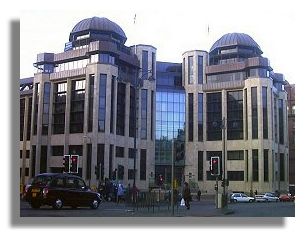 The chief executive of Edinburgh-based Standard Life, one of Europe's largest mutual life and pensions insurance companies, dramatically resigned this week "with immediate effect". The company has been struggling with a number of issues, not least of which is whether to demutualise and float on the London Stock Exchange. And Standard Life has been locked in tough negotiations with the Financial Services Authority over new accounting rules. And like many insurance companies, it has suffered from the decline in stock market values and been forced to cut payouts on to investors. But there had been no hint that chief executive Iain Lumsden, who has been with the company for 36 years, was under any pressure to quit. The company has now announced that it is to carry out a "strategic review" of its business - and will consider demutualisation as "an option".
The chief executive of Edinburgh-based Standard Life, one of Europe's largest mutual life and pensions insurance companies, dramatically resigned this week "with immediate effect". The company has been struggling with a number of issues, not least of which is whether to demutualise and float on the London Stock Exchange. And Standard Life has been locked in tough negotiations with the Financial Services Authority over new accounting rules. And like many insurance companies, it has suffered from the decline in stock market values and been forced to cut payouts on to investors. But there had been no hint that chief executive Iain Lumsden, who has been with the company for 36 years, was under any pressure to quit. The company has now announced that it is to carry out a "strategic review" of its business - and will consider demutualisation as "an option".
Father of House of Commons to Stand Down
 Tam Dalyell, the Member of Parliament for Linlithgow and the longest serving member of the UK Parliament, is to stand down at the next election, bringing to an end a 43-year political career. His long service earns him the largely ceremonial title of "Father of the House of Commons." He gained a reputation as one of the most consistently rebellious MPs - he has been a vociferous critic of the wars in Afghanistan and Iraq and in the days when Margaret Thatcher was Prime Minister, pursued her relentlessly over the sinking of the Argentinean battleship Belgrano during the Falklands war. He began as a Conservative supporter but served mainly as a Labour MP. His genealogical pedigree stretches back to the days of "Black Tam" Dalyell who was a scourge of the Covenanters. He lives in an ancestral home of The Binns which is in his constituency. He argued against a devolved parliament in Scotland and raised the "West Lothian Question" - what would happen when Scottish MPs voted on legislation which only affected England. This is an issue which is now coming home to roost.
Tam Dalyell, the Member of Parliament for Linlithgow and the longest serving member of the UK Parliament, is to stand down at the next election, bringing to an end a 43-year political career. His long service earns him the largely ceremonial title of "Father of the House of Commons." He gained a reputation as one of the most consistently rebellious MPs - he has been a vociferous critic of the wars in Afghanistan and Iraq and in the days when Margaret Thatcher was Prime Minister, pursued her relentlessly over the sinking of the Argentinean battleship Belgrano during the Falklands war. He began as a Conservative supporter but served mainly as a Labour MP. His genealogical pedigree stretches back to the days of "Black Tam" Dalyell who was a scourge of the Covenanters. He lives in an ancestral home of The Binns which is in his constituency. He argued against a devolved parliament in Scotland and raised the "West Lothian Question" - what would happen when Scottish MPs voted on legislation which only affected England. This is an issue which is now coming home to roost.
Jobless Total Falls
The latest figures on the number of people unemployed in Scotland and receiving state benefits has fallen to 98,000 - the lowest figure since September 1975. The statistics also show that there are 129,000 more Scots in employment than at this time last year. More than 2,393,000 people have jobs in Scotland, an improvement of 0.5% on last year. Of course, more women are in work than ever before. Despite the positive aspects of these figures, the numbers employed in manufacturing continues to fall.
Mixed Fortunes on Job Front
 There was gloom in Edinburgh this week when 700 staff employed by finance giant Abbey (that's their recently introduced "fuzzy" logo) were told that their jobs were to be axed. But Abbey are creating 650 new posts in Glasgow - though many of the staff in the capital will be unwilling to commute the 50 miles west. With a buoyant jobs market in Edinburgh, many will be able to find alternative employment there. But when deputy First Minister Jim Wallace expressed "delight" at Abbeys plans he was accused by those in Edinburgh of being "out of touch". Abbey are also believed to be looking at transferring their fund management business from Glasgow to the USA and these high-flying jobs will be hard to replace. It will make Glasgow's aim to create a financial services centre on the banks of the river Clyde more difficult. There was also further bad news on the Edinburgh jobs market where it has emerged that the Scottish Executive is setting up two new organisations to look after transport and the prison service, resulting in 500 jobs moving out of the city to alternative locations.
There was gloom in Edinburgh this week when 700 staff employed by finance giant Abbey (that's their recently introduced "fuzzy" logo) were told that their jobs were to be axed. But Abbey are creating 650 new posts in Glasgow - though many of the staff in the capital will be unwilling to commute the 50 miles west. With a buoyant jobs market in Edinburgh, many will be able to find alternative employment there. But when deputy First Minister Jim Wallace expressed "delight" at Abbeys plans he was accused by those in Edinburgh of being "out of touch". Abbey are also believed to be looking at transferring their fund management business from Glasgow to the USA and these high-flying jobs will be hard to replace. It will make Glasgow's aim to create a financial services centre on the banks of the river Clyde more difficult. There was also further bad news on the Edinburgh jobs market where it has emerged that the Scottish Executive is setting up two new organisations to look after transport and the prison service, resulting in 500 jobs moving out of the city to alternative locations.
Bright Future Predicted for Scotland's Economy
The latest edition of the Bank of Scotland's Index of Leading Economic Indicators, published this week, is forecasting that Scotland's economy will continue to accelerate in the coming year. It also shows that there have been seven consecutive months of economic growth, helped by a number of factors. With interest rates still relatively low, consumers are encouraged to make purchases on credit and the housing market is still buoyant. There is also a healthy labour market with unemployment at a low level and numbers of employed rising.
A Breath of Fresh Air for Scotland
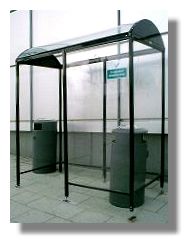 The Scottish Executive has published an "action plan" designed to rid Scotland of the ills of smoking. It stops short of suggesting legislation banning smoking in public places but sets out a range of measures on prevention and education aimed at young people and key target groups. There will also be more support for those who wish to quit. In recent years there has been an increasing number of smoke-free areas in public places and most large indoor shopping malls have a no-smoking policy (hence the smoking booth, illustrated here, outside a large shopping mall). But only a small percentage of businesses in the food and entertainment sector have implemented restrictions on smoking and seven out of ten pubs in Scotland still allow smoking throughout their premises. It is estimated that tobacco kills 13,000 Scots a year, more than five times the total number killed by alcohol-related illness, illegal drugs and accidents combined.
The Scottish Executive has published an "action plan" designed to rid Scotland of the ills of smoking. It stops short of suggesting legislation banning smoking in public places but sets out a range of measures on prevention and education aimed at young people and key target groups. There will also be more support for those who wish to quit. In recent years there has been an increasing number of smoke-free areas in public places and most large indoor shopping malls have a no-smoking policy (hence the smoking booth, illustrated here, outside a large shopping mall). But only a small percentage of businesses in the food and entertainment sector have implemented restrictions on smoking and seven out of ten pubs in Scotland still allow smoking throughout their premises. It is estimated that tobacco kills 13,000 Scots a year, more than five times the total number killed by alcohol-related illness, illegal drugs and accidents combined.
Highway Robbery
Motoring organisations have condemned as a "stealth tax" a suggestion by the UK government to introduce a £5 surcharge on motorists caught exceeding the speed limit. The cash would be used to pay compensation to the victims of crime. More serious motoring offences, such as driving without insurance would incur a £10 surcharge. Motorists are already paying for the most expensive petrol in Europe due to high duty on fuel and the connection between motorists who exceed the speed limit and the victims of assaults and robberies is tenuous for most people.
Rail Chaos as Station Closes
 All train travellers to and from Edinburgh this weekend face disruption due to the closure of Waverley station in the centre of the capital. New signalling equipment is being tested and implemented. Trains into the city will terminate at Haymarket (pictured here), with a bus service taking passengers the rest of the way. But disabled passengers who cannot climb a long flight of stairs, will have to make a long detour as there are no lifts from three of the four platforms at Haymarket. Legislation in recent years demands that proper facilities should be available for disabled customers but so far nothing has been done at Haymarket. Even passengers with heavy luggage have to heave their suitcases up the steep stairs to ground level.
All train travellers to and from Edinburgh this weekend face disruption due to the closure of Waverley station in the centre of the capital. New signalling equipment is being tested and implemented. Trains into the city will terminate at Haymarket (pictured here), with a bus service taking passengers the rest of the way. But disabled passengers who cannot climb a long flight of stairs, will have to make a long detour as there are no lifts from three of the four platforms at Haymarket. Legislation in recent years demands that proper facilities should be available for disabled customers but so far nothing has been done at Haymarket. Even passengers with heavy luggage have to heave their suitcases up the steep stairs to ground level.
It's Official - Scots, English and Welsh are "Ethnic"
In the past, when the Office for National Statistics (ONS) gathered statistics (such as the national census) on people's ethnic origins, those from India, Bangladesh, Africa and even Ireland had boxes to indicate their ethnic background. But there was no differentiation for Scots, Welsh and even English. Now, new guidelines have been issued for conducting official surveys and so these differences will be identified - though there will still be a box for "British" for those who prefer that designation. Surveys will now have two questions on people's backgrounds, one on ethnicity and one on nationality so that people can describe themselves, for example, as "Afro-Caribbean-Scottish" or "white Welsh".
Second Air Terminal for Glasgow
 A £12 million second terminal building is being hurriedly completed by adapting an existing overspill facility at Glasgow airport to attract additional budget airline flights and meet the anticipated increase in passenger numbers. It is being created specifically for the low-cost carriers and easyJet, flyglobespan.com and My Travel are expected to be moving in to the new facility by the middle of this year. There will also be four new aircraft parking stands and a £1.8m hold baggage screening system. The new terminal will be connected to the existing one by a covered walkway. Glasgow is expecting to have an extra 90 flights a week this summer compared to last year. It already handles 8.1 million passengers a year. Although Glasgow is busier than Edinburgh airport, it has been growing in recent years at a slower rate than at the capital.
A £12 million second terminal building is being hurriedly completed by adapting an existing overspill facility at Glasgow airport to attract additional budget airline flights and meet the anticipated increase in passenger numbers. It is being created specifically for the low-cost carriers and easyJet, flyglobespan.com and My Travel are expected to be moving in to the new facility by the middle of this year. There will also be four new aircraft parking stands and a £1.8m hold baggage screening system. The new terminal will be connected to the existing one by a covered walkway. Glasgow is expecting to have an extra 90 flights a week this summer compared to last year. It already handles 8.1 million passengers a year. Although Glasgow is busier than Edinburgh airport, it has been growing in recent years at a slower rate than at the capital.
New Air Routes
A new direct air route between Edinburgh and Munich in Germany was announced this week. Duo already operates scheduled flights to Geneva, Milan, Oslo and Zurich using small Canadair R.Jet aircraft. The new route is the 17th to be supported by the Scottish Executive's £6.8 million Route Development Fund. Meanwhile, Croatia Airlines has announced that it will fly the first direct flights between Glasgow and the former Yugoslavia with a weekly service to the Adriatic port of Dubrovnik in the summer months. For a complete survey of all direct international flights to Scotland see International Air Services to Scotland.
Superfast Ferry on a Roll
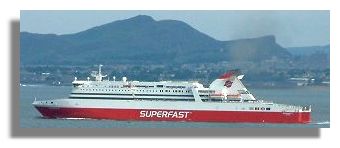
Despite initial concerns that Scottish haulage companies were not using the new Rosyth to Zeebrugge (in Belgium) ferry service, Superfast Ferries now report that over the last year they have doubled the volume of freight being carried. More than 300 haulage firms are now using the service on a regular basis, saving on fuel and time. Lorry drivers are said to enjoy the overnight crossing which leaves Rosyth in the early evening. From the outset, passenger traffic has always been good but there were concerns at first that the lack of profitable cargo could eventually cause the service to be withdrawn.
Shifting Sandstone
While most of the red sandstone apartment blocks built in Scotland in the early part of the 20th century or even earlier were constructed from good quality stone, problems are starting to appear on some Victorian tenements and the sandstone is beginning to crumble. Owners are being confronted by massive repair bills which many, already paying large mortgages, just cannot afford to meet. Experts estimate that as many as 10% of the flats in Edinburgh, Glasgow, Dundee and other towns across Scotland could be at risk - and that could mean as many as 20,000 properties. The warning came after the owners of a five-storey block in Edinburgh's Bruntsfield area were told that they will be forced to pay for its crumbling stones to be replaced by the city council as they are a danger to people walking on the pavement below. They face bills of £50,000 each on property ranging in value from £150,000 to £300,000. Edinburgh is leading the way in dealing with dangerous buildings after an incident in the city when someone was killed by falling masonry in the city centre. Stone for many of the apartment blocks built in Edinburgh were sourced at Craigleith Quarry which proved to be very hard-wearing as it is 99% quartz. But stone can contain a high proportion of clay which can be adversely affected by decades of rain, pollution and freezing and thawing.
Theatre Ghost Staging a Return
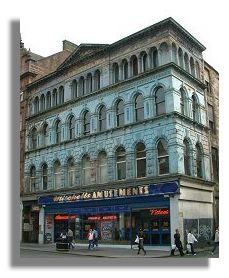 A BBC Scotland TV documentary on the country's famous haunted buildings claims that while filming in a Glasgow theatre (which closed in 1938), the camera crew heard heavy breathing which seemed to move around when they did and got louder whenever they asked questions. The Panopticon on Trongate was recently featured in a TV series on preserving old buildings. As a result of the publicity, the theatre is to open later this month - for one performance as part of the Celtic Connections music festival. The theatre opened in 1858 as the Britannia Halls before being renamed Panopticon in 1906. The producers of the "Ghostbusters" programme have speculated that the ghost could be a disgruntled bit-part actor harbouring notions of performing a major role. Stan Laurel made his acting debut at the Panopticon in 1910 - and Cary Grant was later part of a troupe of tumblers at the theatre.
A BBC Scotland TV documentary on the country's famous haunted buildings claims that while filming in a Glasgow theatre (which closed in 1938), the camera crew heard heavy breathing which seemed to move around when they did and got louder whenever they asked questions. The Panopticon on Trongate was recently featured in a TV series on preserving old buildings. As a result of the publicity, the theatre is to open later this month - for one performance as part of the Celtic Connections music festival. The theatre opened in 1858 as the Britannia Halls before being renamed Panopticon in 1906. The producers of the "Ghostbusters" programme have speculated that the ghost could be a disgruntled bit-part actor harbouring notions of performing a major role. Stan Laurel made his acting debut at the Panopticon in 1910 - and Cary Grant was later part of a troupe of tumblers at the theatre.
50-year Success Story
Conservationists and ornithologists will be celebrating a remarkable success story this year - the 50th anniversary of the return of ospreys to Scotland. These spectacular birds, which dive into lochs to catch fish, were wiped out by 1916. Then a lone pair of these raptors returned to Loch Garten near Aviemore in 1954. Although this was an act of nature, it took all the efforts of the Royal Society for the Protection of Birds, the Forestry Commission and Scottish Wildlife Trust to protect and nurture the nesting birds. 24-hour watches and closed-circuit television were used to protect the nests from egg collectors. Slowly, the numbers have increased and spread so that last year there were 160 breeding pairs. Ospreys migrate to west Africa in winter and there is always a sense of anticipation each year to see how many will return to breed. There are now nesting sites at Aberfoyle in the Trossachs, Glentrees Forest near Peebles, Loch of Lowes near Dunkeld as well as the original site at Loch Garten - which has been visited by nearly two million bird lovers over the last 50 years.
Amaryllis Withers
 Celebrity chef Gordon Ramsay shocked the catering trade this week by closing down his award-winning Amaryllis restaurant in Glasgow. The high profile eatery opened in April 2001within the five star hotel One Devonshire Gardens, a favourite haunt of many in the entertainment industry including Kylie Minogue, Robbie Williams, Elton John and Rod Stewart. The Amaryllis has three rosettes in the AA Hotel and Restaurant Awards and a coveted Michelin star. There was little explanation given for the sudden closure other than Ramsay "consolidating on London outlets".
Celebrity chef Gordon Ramsay shocked the catering trade this week by closing down his award-winning Amaryllis restaurant in Glasgow. The high profile eatery opened in April 2001within the five star hotel One Devonshire Gardens, a favourite haunt of many in the entertainment industry including Kylie Minogue, Robbie Williams, Elton John and Rod Stewart. The Amaryllis has three rosettes in the AA Hotel and Restaurant Awards and a coveted Michelin star. There was little explanation given for the sudden closure other than Ramsay "consolidating on London outlets".
Internet Castle Auction Fails to Find Buyer
There was world-wide publicity when Castle Lee was offered for sale on the Internet last September. The Web site declared that only the rich and famous need apply. Initially, those interested had to provide their name and details which were then to be vetted and checked to see if they had the resources to buy the property. The Lockhart family owned the estate for 700 years although today's castle is really a 19th century mansion. The property, with 261 acres and a baronial title, attracted a lot of interest but it also attracted many Walter Mitty characters who had fanciful dreams but no cash to back it up. An offer of £7 million came from a man who claimed to be an American businessman with a personal fortune of £80 million. He provided bank statements and letters of credit but as negotiations were reaching a conclusion it turned out he lived in a modest house in California worth around £90,000. Another prospective purchaser claimed to own a French chateau but lived in a two-bedroom flat in Ohio.
Slimming Down the Police Force
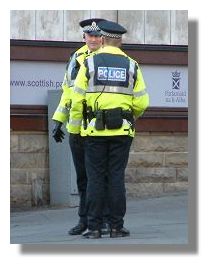 In popular literature and entertainment shows, from PC Murdoch in "Oor Wullie" cartoons to the recent "Fast Show" on TV, police officers are often portrayed as plodding and being somewhat overweight. But now Lothian and Borders Police are taking steps to make sure that in reality they have slimmer, fitter constables on the "thin blue line". In a move which is believed to be the first by any UK police authority, calorie-controlled weight-watcher diets are being introduced to the staff restaurant at police HQ at Fettes Row. The initiative has been set up after it was revealed that an alarming number of officers quit early on grounds of ill health - though there are also other factors involved. But an increasing amount of time spent on desk duties and in patrol cars contributes to poor health amongst some police officers.
In popular literature and entertainment shows, from PC Murdoch in "Oor Wullie" cartoons to the recent "Fast Show" on TV, police officers are often portrayed as plodding and being somewhat overweight. But now Lothian and Borders Police are taking steps to make sure that in reality they have slimmer, fitter constables on the "thin blue line". In a move which is believed to be the first by any UK police authority, calorie-controlled weight-watcher diets are being introduced to the staff restaurant at police HQ at Fettes Row. The initiative has been set up after it was revealed that an alarming number of officers quit early on grounds of ill health - though there are also other factors involved. But an increasing amount of time spent on desk duties and in patrol cars contributes to poor health amongst some police officers.
Seasonal Gimmicks Help Garden Centre Sales
There are not many folk buying plants for their garden in December but garden centres still generate a high level of turnover in the run-up to Christmas with sales of decorations and outdoor lights. The latter are becoming very popular in Scotland, with trees and bushes festooned with twinkling lights in many suburban gardens. Dobbie's the Edinburgh based garden centre chain has reported that its sales in the nine weeks to 29 December increased by 17.1% over last year, helped by a TV advertising campaign and gimmicks such as Santa Claus arriving at their premises by helicopter - and classes on how to decorate a Christmas tree. The company now has 18 sites across Scotland and the north of England.
Bloom or Bust?
 The scientists at the Royal Botanic Gardens in Edinburgh are reporting that plants in their garden are responding to warmer than usual weather by flowering much earlier than usual. They point to the Chinese witch hazel - Hamamelis Mollis - which has been in flower for the last three months and should only have been producing its oddly shaped petals in December. Spring flowering aconites are already in bloom and rhododendrons are also flowering - and it's only January. 2003 was the hottest, driest and sunniest since records began and five months of the year were "exceptionally warm" measuring at least 2C above average - and the plants are responding. For only the fourth time in recorded history, all the snow completely melted on Scotland's mountains - even in north-facing corries. While the warmer temperatures are a boon to fruit growers and are producing more flowers in the winter months, the biologists also warn that the milder climate could increase the amount of disease amongst the plants. And any late frosts could damage flowers which are too far ahead of their normal season.
The scientists at the Royal Botanic Gardens in Edinburgh are reporting that plants in their garden are responding to warmer than usual weather by flowering much earlier than usual. They point to the Chinese witch hazel - Hamamelis Mollis - which has been in flower for the last three months and should only have been producing its oddly shaped petals in December. Spring flowering aconites are already in bloom and rhododendrons are also flowering - and it's only January. 2003 was the hottest, driest and sunniest since records began and five months of the year were "exceptionally warm" measuring at least 2C above average - and the plants are responding. For only the fourth time in recorded history, all the snow completely melted on Scotland's mountains - even in north-facing corries. While the warmer temperatures are a boon to fruit growers and are producing more flowers in the winter months, the biologists also warn that the milder climate could increase the amount of disease amongst the plants. And any late frosts could damage flowers which are too far ahead of their normal season.
Weather in Scotland This Week
An unexpected fall of snow overnight between Monday and Tuesday created treacherous driving conditions for many commuters in central Scotland. Although the snow did not last for long, it caused a five-vehicle pile-up on the A77 road between Glasgow and Kilmarnock and the M90 south of Kinross was closed for a time when two lorries got stuck. Temperatures remained low for most of the week, hovering around 4/6C (39/43F). The west also saw a lot of rain this week - Glasgow had over two inches falling between Sunday and Tuesday. Friday proved to be the only really sunny day during the week - nearly five hours of sunshine were recorded in the west.
It's not just in the Royal Botanic Gardens in Edinburgh that they are experiencing plants coming into bloom early. The rhodendron below, admittedly an early flowering variety, seems to be enjoying the one and only sunny day experienced in Glasgow's Botanic Garden at Kelvingrove this week.

|


The Scottish Snippets Newsletter in its original format began in April 1997 and continued in an unbroken series for 591 issues. Although no longer produced in that format there is now a regular update on the new and updated pages on the Rampant Scotland site and also "Scottie's Diary" on an intermittent basis, To receive this, kust send an e-mail to Scottie with "Subscribe Newsletter" in the subject line.
 Historical Affairs - Topical Items from Scotland's Past
Historical Affairs - Topical Items from Scotland's Past


